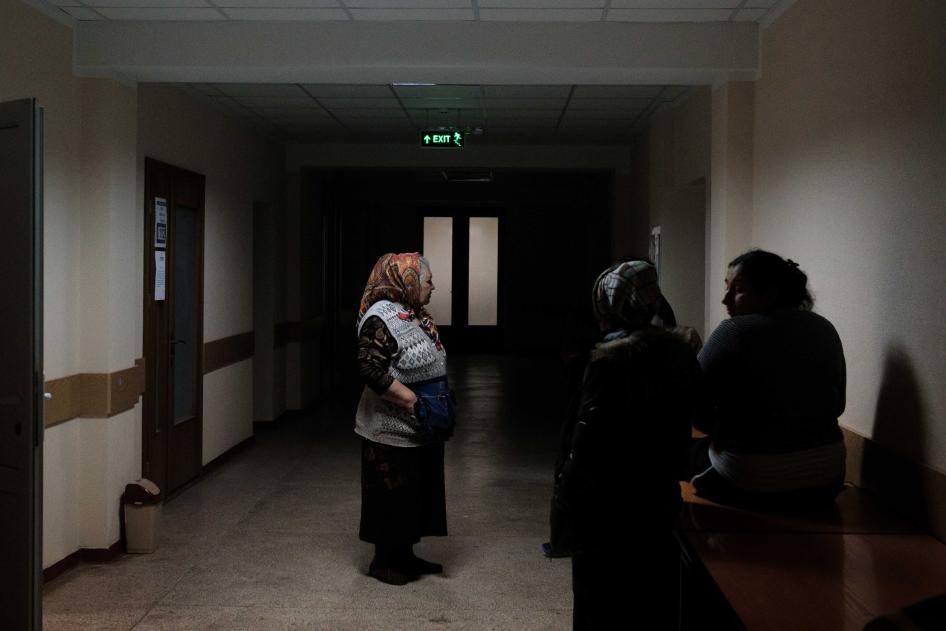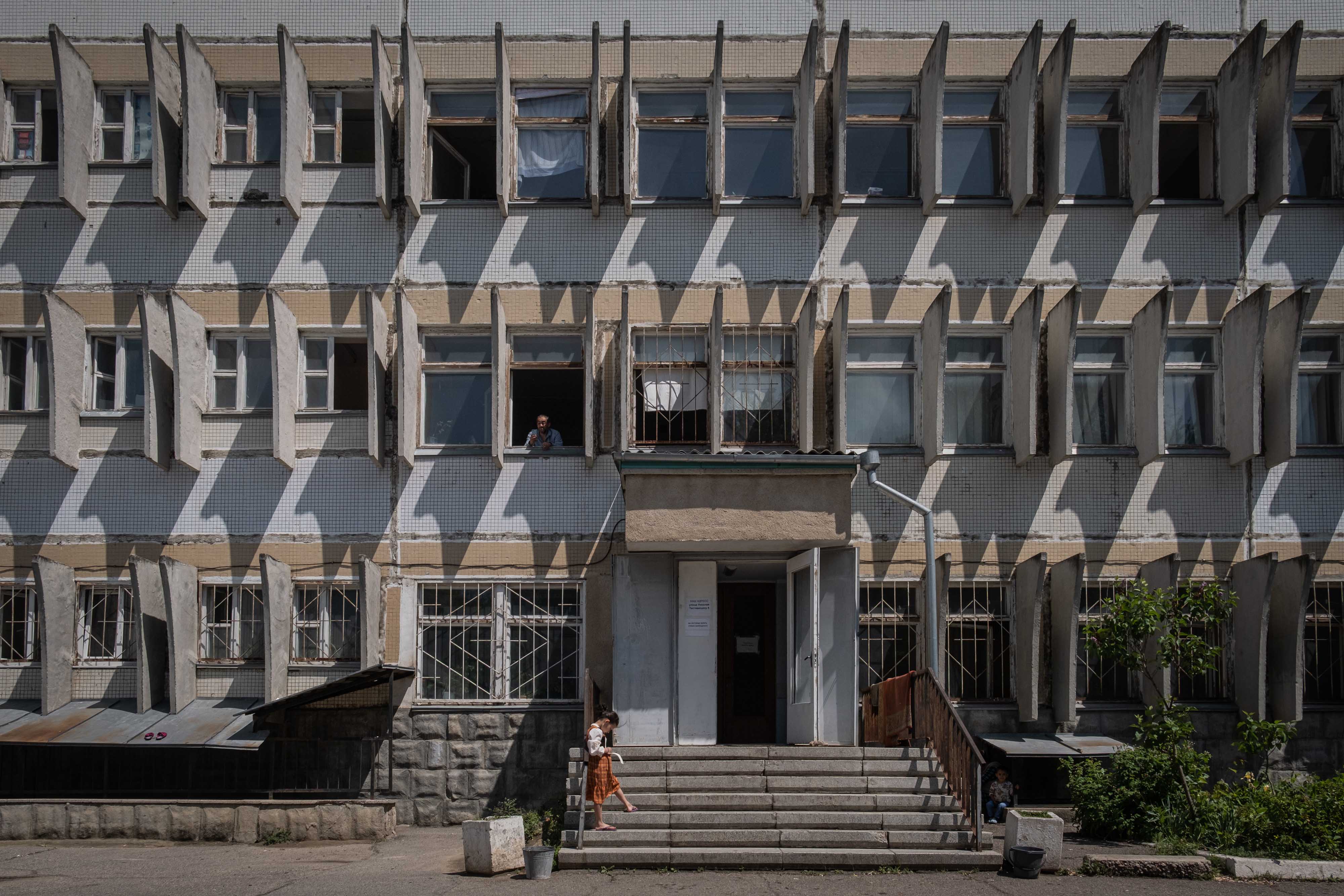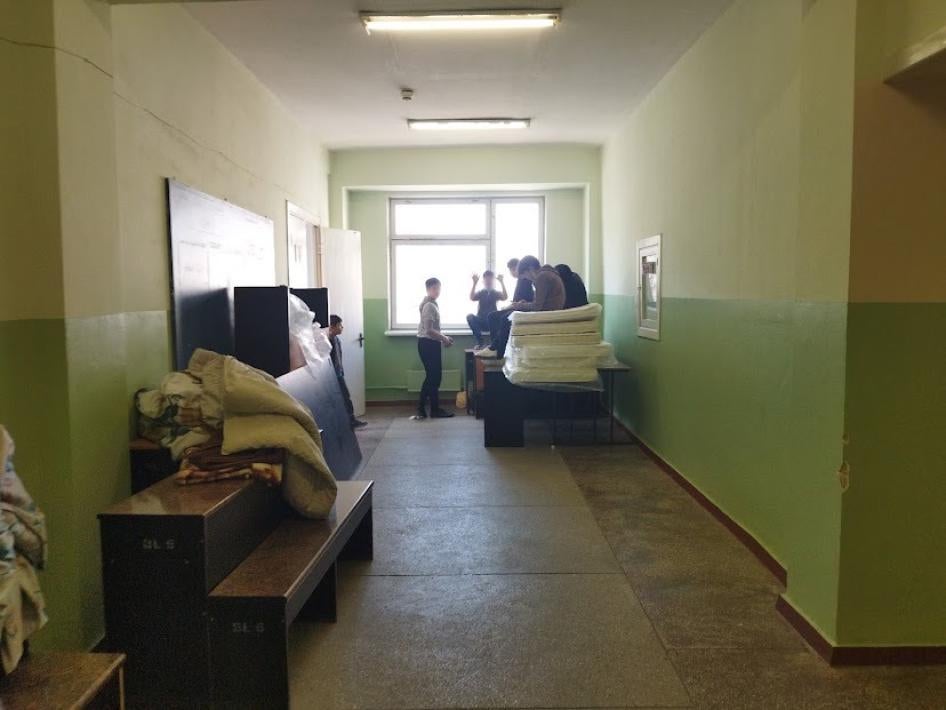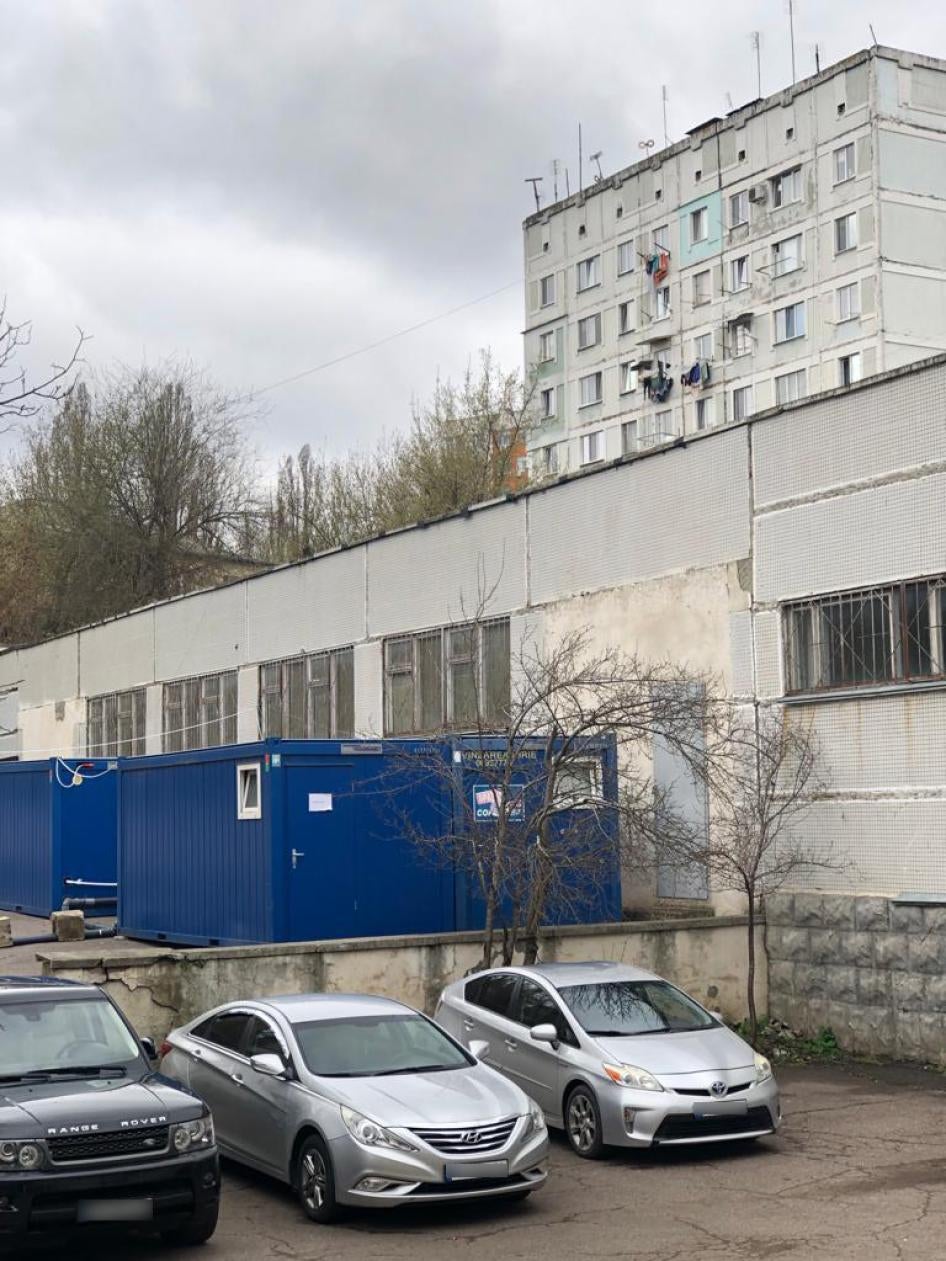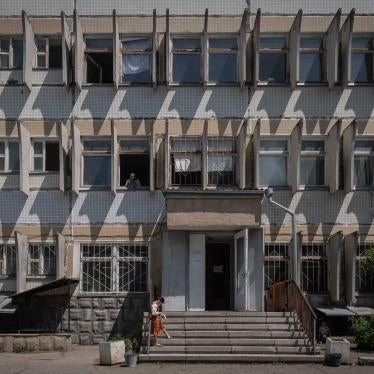(Berlin) – Moldovan authorities are deliberately housing most Romani refugees separately from others fleeing the war in Ukraine, in a manner that constitutes unequal and discriminatory treatment, Human Rights Watch said today. Amid pervasive discriminatory attitudes toward Roma, government authorities have permitted and, in some cases, directed staff and volunteers to deny Romani refugees housing at government-run facilities.
“Moldovan authorities have offered critical support to people fleeing Ukraine, but that does not excuse segregation of Romani refugees,” said Anastasiia Kroupe, assistant Europe and Central Asia researcher at Human Rights Watch. “Regardless of the economic and social problems Moldova faces, the government has a responsibility to ensure that refugees are not discriminated against on the basis of ethnicity.”
Since February 24, 2022, more than 471,000 refugees have crossed into Moldova from Ukraine, the highest per capita influx to a neighboring country. About 87,700 refugees have stayed in Moldova, one of the poorest countries in Europe.
Between March 30 and April 5, Human Rights Watch visited and interviewed 7 members of police, border patrol, and social services at the Otaci and Palanca border crossings as well as 10 staff and volunteers working at transit and reception sites, and 13 refugees staying at 3 reception centers in the capital, Chisinau. Human Rights Watch also interviewed representatives of 3 United Nations agencies, 10 staff of nongovernmental organizations, and 2 Roma rights activists in Chisinau.
Human Rights Watch found a practice that appeared to be based on an agreed policy to segregate Romani refugees in designated state-run reception centers, and to deny Romani refugees housing together with other refugees in alternate state-run centers.
Since mid-March, almost all Romani refugees whose housing has been processed by the government have been placed in a previously abandoned university building at the Faculty of International Relations, Political Sciences, and Public Administration (FRISPA). Many were transferred there from the Manej Sports Arena, while later arrivals said they were directed there from the border, train station, or MoldExpo reception center without being informed of any other accommodation options.
Roma rights defenders and volunteers told Human Rights Watch that conditions at Manej were inferior to those in other facilities. The European Roma Rights Center (ERRC) said that living conditions at Manej and in the first days after FRISPA refugee center opened were “inadequate” and “poor.”
Volunteers who worked to find housing for refugees said that, from the outset of the crisis, some center administrators refused to accept Romani refugees. A government official told volunteers they should confirm refugees’ ethnicity before placing them in housing to avoid problems, even while admitting it was a form of racial profiling.
Staff and volunteers in Chisinau’s exhibition center, MoldExpo, which serves as the country’s largest reception center, said that city authorities had an unwritten “policy” denying almost all Roma housing at the center. “The government ordered that this is not a place for Romani people,” a MoldExpo employee said.
MoldExpo staff and volunteers said that central government authorities took over responsibility for the center from the city authorities on March 16 but did not communicate any change to this policy. On April 2, Human Rights Watch researchers witnessed MoldExpo staff denying a Romani family housing at MoldExpo on false grounds that there was no space available and that they did not have the necessary documentation.
MoldExpo’s director and Chisinau’s mayor told Human Rights Watch that no such policy has ever existed. The government of Moldova had not responded to a Human Rights Watch request for comment on the findings and additional information.
Leaders of the Moldovan Romani community and volunteers who took part in government meetings told Human Rights Watch that some of the leaders taking part in the meetings in early March agreed that Romani refugees could be accommodated separately in Manej as a temporary measure with the aim of better meeting their needs.
Moldovan authorities should urgently end any policy, official or unofficial, to segregate Roma, and take steps to counter discriminatory attitudes toward Romani people, including Romani refugees from Ukraine, Human Rights Watch said. The authorities should ensure equal access to reception centers, housing, and all services and humanitarian aid for Romani and non-Romani refugees, and provide all refugees with equivalent information and options regarding housing. The EU and international and regional organizations should urge Moldova to ensure fair and equitable treatment of Romani refugees.
The government should consult with Romani refugees regarding their specific needs. The authorities should ensure that they maintain communication with Romani leaders, including in Ukraine, and provide needed services, including by barring discrimination in recruitment and hiring, and actively working to recruit and hire Romani volunteers and staff.
“The Moldovan government should take all possible steps to fight discriminatory attitudes toward Romani people rather than enabling or reinforcing them,” Kroupe said. “Romani people have the same rights as anyone else fleeing the war in Ukraine, and Moldovan authorities should set a positive example for the entire region by upholding these rights and treating Romani and other refugees equally.”
For more details, please see below.
Discriminatory Attitudes Toward Romani refugees in Moldova
Romani people face pervasive bias and persistent discrimination in both Ukraine and Moldova. The estimated 400,000 Roma in Ukraine before the Russian invasion faced high levels of poverty and lack of access to employment, education, and health care. They also faced prejudice, hate speech, and violent attacks by radical groups that the authorities do not properly investigate. The United Nations Children's Fund (UNICEF) called Roma in Moldova “one of [the country’s] most disadvantaged minority groups,” with most Romani families living in poverty and lacking basic services. Ukrainian Romani refugees in Moldova contend with hostile, discriminatory attitudes from other Ukrainians, Moldovan citizens, and government officials.
A member of the border police interviewed at Palanca, the main border crossing from Ukraine, accused Romani people of trafficking, particularly in children and children’s organs, but was unable to point to any documented cases to substantiate his claims. A volunteer working at MoldExpo echoed the belief that Romani people engage in human trafficking.
Volunteers and staff at reception sites, as well as Moldovan Roma rights activists and nongovernmental organization representatives, said that some officials and staff at reception facilities accuse Roma of stealing or claim they are non-Ukrainians attempting to take advantage of humanitarian aid. A Roma rights organization leader said they accompanied a Romani woman with a Ukrainian passport into MoldExpo on February 26 after she had been denied entry. The Roma leader said a city government representative implied that Romani people were stealing from the facility: “She told us, ‘Go away! Things are missing from here already!’”
The government appointed a member of parliament to represent and advocate for each reception center. A volunteer working at FRISPA, the abandoned university building where Roma have been housed, said that the associated parliament member instructed her to deny Romani refugees access to canned goods and hygiene products stored in a locked cupboard for humanitarian aid items, saying, “We are not going to give these refugees anything because they steal it.”
Many people interviewed repeatedly categorized Romani people, regardless of their citizenship status, as distinct from “Ukrainians.” In police statistics on refugees accommodated at FRISPA, “Roma” and “Ukrainians” were calculated separately. Police at the center confirmed that “Ukrainians” did not include Roma who were Ukrainian citizens. Romani refugees also said they experienced discrimination.
“I just want to know where we can reunite with my family so that we are not mistreated as Roma,” said a Romani refugee from Ukraine, now a resident at the FRISPA refugee center.
Most refugees from Ukraine in Moldova are housed in private accommodations, but volunteers said that some private hosts refused to accept Romani people. One volunteer said families would write “No Roma” on their online application form to host refugees. The leader of a Romani women’s rights organization said that some Romani refugees returned to Ukraine because they couldn’t find housing either at reception centers or in private homes.
Ukrainian Romani refugees also faced hostile attitudes from other Ukrainians in Moldova. Volunteers and Roma rights activists said that some non-Romani refugees from Ukraine refused to stay in refugee reception centers with Romani refugees. They also said that non-Romani Ukrainians refused to board buses to other locations in Europe with Romani passengers.
Discriminatory Reception Policy
Volunteers who find housing for refugees said that, from the outset of the refugee influx, many reception center administrators refused to accept Romani refugees. “When we would call centers and were asking them to host a group of people [they told us], ‘Sure, bring them in, just make sure they are not Roma,’ or ‘make sure they are Ukrainians,’ [or] ‘white people,’” said one volunteer. “One time we were told to make sure they are ‘pure Ukrainians.’”
A volunteer said the administrator of a center on a university campus used discriminatory stereotypes when refusing to house Romani refugees. “I would call the center … and [the administrator] asked me, ‘Well, are they Roma? Because I’m not taking any Roma,’ and ‘Oh, I know [Romani people], I know what they do, they go and they follow people into the toilet. We know them. They scare our students,’” the volunteer said.
Volunteers also said that officials asked them to confirm refugees’ ethnicity before placing them in reception centers or private housing. A volunteer said that when she objected, a government representative replied, “I know this is not a good thing to ask, but we do have to unfortunately do some kind of minimum profiling” to avoid problems with host families or with non-Romani refugees in reception centers.
In early March, the authorities decided to accommodate Romani refugees almost exclusively at the Manej Sports Arena reception center. Volunteers and Moldovan Roma leaders who participated in meetings with government officials where this was discussed said that some of them agreed that most Romani refugees could be accommodated together at the center as a temporary solution with the aim of better meeting their needs and ensuring their transfer to centers with quality services.
However, they said, conditions at Manej were inferior to conditions at other facilities, including a lack of privacy and lack of heating and hot water even though it was very cold outside. A Romani refugee who stayed at Manej for about 10 days confirmed there had been no heat. Volunteers and Roma leaders also said refugees were not provided with services such as access to Roma community mediators and assistance with documents, which is a particular need as many Romani people lack identity documents. Volunteers also said that Romani refugees were not transferred to other centers as they had anticipated.
Volunteers, staff at reception centers, and Romani refugees said that since the government closed the Manej facility around March 16, virtually all Romani refugees are now sent to the FRISPA reception center. A volunteer at MoldExpo said in early April that, although three centers were accepting new residents, “we want [Romani refugees] to be brought to [FRISPA] because it is a center for Roma only.”
Romani residents and volunteers working at FRISPA confirmed that Romani people had been transferred there from Manej or directed there from border reception sites, other transport hubs or MoldExpo without receiving information about any other reception facilities. In at least some cases, they were sent to FRISPA with the understanding that it is the center accommodating Romani refugees.
A Romani man at FRISPA said his son and his son’s family “were brought to a place where it was all Roma,” the Manej facility, and he and his wife followed them when they arrived in Moldova. His wife said they had “no choice” when transferred from Manej to FRISPA. Another Romani woman refugee said that volunteers told her to go to FRISPA and that a minibus took her there directly from the Chisinau train station. When Human Rights Watch visited to FRISPA on April 3, 2022, the largest number of residents were Romani refugees, followed by Azeris.
A volunteer at FRISPA, some Romani refugees housed there, and two Roma rights activists said that the FRISPA building was unprepared for housing refugees when they were first transferred there. They said they had no beds or bedsheets for the first night, and only one shower with a small boiler for the first days. They also reported a lack of hygiene kits, as well as low food quantity and quality. Since then, the authorities have significantly improved the conditions, including by providing mattresses, containers outside the facility with showers, and washing machines.
Volunteers said that government representatives contended that the reluctance or refusal, in some cases, of non-Romani Ukrainian refugees to stay at Manej due to the presence of Romani refugees was why the center housed mostly Romani refugees. These volunteers said that the dynamic was facilitated because administrators of other centers and private families were unwilling to receive Romani people and that there had been a decision to intentionally accommodate Romani refugees together at Manej.
Volunteers and Roma rights activists also said there was no Romani staff at any of the reception sites, including FRISPA.
Denial of Housing at MoldExpo
On February 24, the day the Russian full-scale invasion of Ukraine began, the Chisinau city government converted the MoldExpo exhibition center, previously used for Covid-19 patients, into a refugee reception center with about 450 beds. MoldExpo also provides additional services for all refugees, including registration for free transportation abroad and legal and cash assistance from the United Nations High Commissioner for Refugees (UNHCR).
Representatives of Roma rights organizations who were at the site said that the people running the center had denied Romani refugees housing at MoldExpo from the outset, and that police forced them to stand in a separate line to register with the authorities and to be transferred to other centers. The police would not permit them to come inside, while non-Romani refugees were allowed to enter.
Staff and volunteers working at MoldExpo said that representatives of the Chisinau Mayor’s Office had visited the facility around March 7 and gave verbal instructions that the center would no longer accept Romani refugees. “[Staff from the mayor’s office] came and said we don’t accept Romani people here anymore,” a volunteer said. “For those who were already here, they got in touch with a Roma leader and arranged accommodation for them and moved them out.” The volunteer estimated that about 40 Romani refugees were removed from MoldExpo at that time.
Volunteers and staff said that the central government did not announce any changes to this policy after taking over MoldExpo’s management on March 16. A staff member said that, when she started working at MoldExpo on March 22, someone from the center’s administration instructed her that “this was not a place for Romani people.” A refugee staying at MoldExpo said on April 4 that no Romani families had been accepted to stay there since she arrived more than two weeks earlier.
Staff and volunteers said that Romani refugees coming to MoldExpo are told to go to the FRISPA center. They said MoldExpo only accommodates Romani families in exceptional circumstances, such as when they arrive in the middle of the night. MoldExpo’s director and other staff and volunteers said that two Romani families were housed in MoldExpo at the time of the Human Rights Watch visit; some specifically described them as “good” and “quiet” families.
On April 2, Human Rights Watch witnessed staff denying housing to a family of five Romani women and girls at MoldExpo, telling them there was no space available at the center and that they did not have the necessary documentation confirming that they had crossed the border from Ukraine.
“They said, ‘We don’t know where you have been these [past] months, you don’t have a stamp in your passport,’” said the grandmother of the family. “They said there is no space here.” Her daughter said they were told to go to FRISPA. The family had Ukrainian identification documents.
On the same day, MoldExpo’s director confirmed to Human Rights Watch that the center had over 100 free spaces, and that Ukrainian internal identification documents or international passports are acceptable for admittance. She and other staff members and volunteers said that Ukrainian citizens or people with Ukrainian residency permits and stamps showing they crossed the border after February 24 are eligible to stay at MoldExpo, and that those without documents are sent to the Bureau of Migration and Asylum.
MoldExpo’s director said for Romani refugees, “there is a different center.” However, she also said the facility has no policy about housing Romani refugees and that the center accepts everyone without exception. She said there were fewer Romani refugees at the facility because the first people to flee the war were mostly “Ukrainians” (non-Roma).
In a letter to Human Rights Watch dated April 19, Chisinau Mayor Ion Ceban confirmed that his office was responsible for the MoldExpo reception center between February 24 and March 15, and said that during this time “no restrictions or ‘selective’ placement elements for certain ethnic groups were imposed.” He said that MoldExpo accommodated refugees of multiple nationalities and ethnicities during this period, including Ukrainians, Roma, Tajiks, Azeris, Indians, Tunisians, and Russians.
International Standards and National Law
The principle of non-discrimination is a core principle of international human rights law, enshrined in the International Covenant on Civil and Political Rights, International Covenant on Economic, Social and Cultural Rights, International Convention on the Elimination of All Forms of Racial Discrimination, and European Convention on Human Rights and Fundamental Freedoms. Moldova has ratified all of these treaties.
The principles of non-discrimination and equality of ethnic minorities are set out in the Declaration on the Rights of Persons Belonging to National or Ethnic, Religious and Linguistic Minorities. Article 3 of the 1951 Geneva Convention relating to the Status of Refugees – which the Republic of Moldova is a party to – prohibits discrimination, including based on race.
The United Nations special rapporteur on adequate housing has specifically said that countries must ensure “equal enjoyment of the right to housing without discrimination” for all migrants, including refugees, and the Committee on Elimination of Racial Discrimination has also explicitly said that countries should “guarantee the equal enjoyment of the right to adequate housing for citizens and non-citizens, especially by avoiding segregation in housing and ensuring that housing agencies refrain from engaging in discriminatory practices.”
Article 6 of Moldova’s 2012 Law No. 121 on Equality prohibits any forms of discrimination, including based on race and ethnic origin. On February 26, the Ministry of Labor and Social Protection issued rules regulating the work of a “refugee temporary placement center.” Article 3 of the Rules stipulates that “the center should ensure the principle of non-discrimination on all stages of services provision, promoting and respecting human rights, regardless of race, skin color, nationality, ethnicity.”
